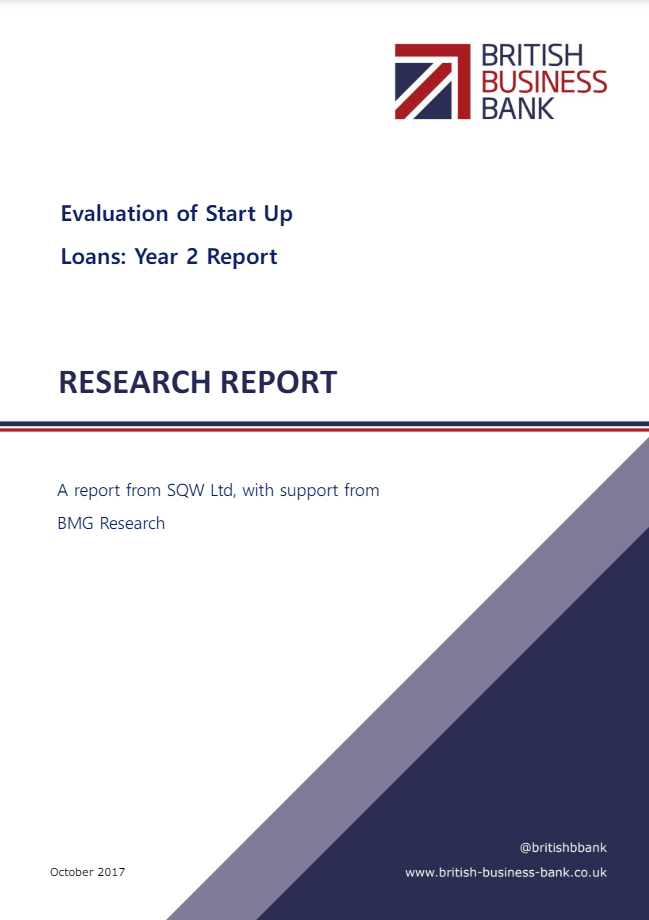Report and publications
About the programme
- The Start Up Loans programme offers loans, alongside business support and mentoring, to individuals across the UK looking to start a business or to develop a recently-established business. By the end of May 2017, the programme had lent over £319m to individuals, via over 48,000 loans, with an average loan value of approximately £6,630 over the programme life.
- The programme is managed by the Start Up Loans Company (SULCo), and funded by the Department for Business, Energy and Industrial Strategy (BEIS). On April 1st 2017, SULCo became a subsidiary of the British Business Bank.
- The underlying case for the programme is that banks and other mainstream finance providers do not meet the demand for loans for start-up companies owing to the lack of collateral, credit history and/or trading history amongst applicants, and the low margins associated with low value loans. In addition, there can be barriers to accessing appropriate external advice for people looking to start a new business. Further, there is an equity argument, with enterprise and self-employment seen as a way to improve individuals’ economic prospects.
- The programme involves three main stages: initial ‘pre-application support’ to help individuals to develop a business plan; a personal loan to start-up/develop a business; and mentoring support to help develop and grow the business.
- SULCo uses a network of just under 30 Delivery Partners to deliver the programme, responsible for the provision of pre-application support, loan assessment and mentoring support.
The evaluation
- SQW Ltd, working with BMG Research, was commissioned by the British Business Bank in 2014 to undertake a longitudinal evaluation of the programme, with inputs also provided by Aston Business School. The evaluation is a long-term research programme, expected to deliver its final report in 2018 or 2019.
- The purpose of the evaluation was to provide a robust assessment of the economic impact of the programme, and whether it represents value for money. Alongside these ‘programme effectiveness’ questions, the evaluation was tasked with testing ‘programme delivery’ aspects, in particular the extent to which different degrees of take-up of the pre-application and mentoring support affected business and individual outcomes.
- The evaluation has adopted a quasi-experimental approach. This has compared the performance, via econometric analysis, of a group of individuals drawing down a Start Up Loan over the period from June to December 2014, to a matched comparison group of individuals that were also looking to or had recently started a business in the same period as the beneficiary group but had not been supported by the programme. The evaluation has also drawn on ‘self-reported’ evidence provided by beneficiaries to provide a complementary perspective on the effects of the programme.
- The core evidence base that was drawn on for the Year 2 Report was a tracking survey of the beneficiary group (with 330 survey completions) and the matched comparison group (with 334 survey completions). This quantitative evidence was complemented by the findings from in-depth case studies with six Delivery Partners, interviews with programme partners and stakeholders, and a second wave of an online survey of Delivery Partners (with responses from 23 Delivery Partners).
- This Year 2 Report represents the second output of the evaluation, following the publication of a Year 1 Report in early-2016. Year 2 of the evaluation has involved an interim assessment of the effects of the programme, updating and extending the evidence from Year 1. The Year 2 report has focused on the following:
- from a programme effectiveness perspective, the evidence on the effects of the programme on the business start-up rate, business survival, early evidence on business performance in terms of sales, employment and other business outcomes and the impact of mentoring when comparing beneficiaries and the comparison group
- from an economic perspective, the extent to which the programme represents value for money through a cost-benefit analysis
- from a programme delivery perspective, the evidence on the effects of mentoring support within the beneficiary group, including the intensity of mentoring support
- from a loan book perspective, the relationship between repayment levels and business performance.

Evaluation of Start Up Loans - Year 2 Report
Learn how the Start Up Loans programme has performed over its second year of operation.